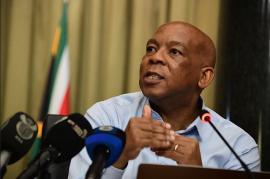
South Africa is preparing to develop a comprehensive nuclear industrialisation plan that goes far beyond simply converting nuclear energy into electricity, according to Minister of Electricity and Energy, Dr Kgosientsho Ramokgopa.
“It’s not just about converting nuclear energy into electricity. It’s about what benefits the South African economy and what components within the nuclear fuel cycle we can domesticate or localise,” Ramokgopa said.
The Minister was speaking during a media briefing on Sunday, where he unveiled the
Integrated Resource Plan (IRP) 2025 following its approval by Cabinet on Wednesday, 15 October 2025.The R2.2 trillion IRP is a comprehensive strategy that outlines the allocation of South Africa’s primary energy resources, ensuring that the country’s electricity demand is met sustainably and cost-effectively.
By 2039, government aims to add 105 000 megawatts of new generation capacity – effectively building Eskom “two and a half times” its current size.
Key highlights include 11 270 megawatts of solar photovoltaics (PV) by 2030; 7 340 megawatts of wind energy; 6 000 megawatts of gas-to-power, and 5 200 megawatts of new nuclear capacity.
“Nuclear is a big part of our conversation. We’re building 5 200 megawatts of new nuclear capacity in this country. I have made the point that the State will not prevaricate.
“The State will ensure that we are very deliberate, we are transparent in the way we are going to procure this clean energy technology solution. Nuclear... is a big part of what we’ll be doing.”
According to Ramokgopa, the strategy involves close collaboration with scientists to identify specific opportunities for local manufacturing and economic development.
“You know that we have haemorrhaged the skills the [of the] scientists [who] have left as a result of us not building any new nuclear programme. They have left and are all over the world. It’s important that the industrialisation plan also answers the questions: where are the skills going to come from, and how are we going to generate the pipeline of skills going into the future?”
Ramokgopa recognised that there is a shortage of skills needed to support this programme. To address this, he is collaborating with universities, and Technical and Vocational Education and Training (TVET) colleges, particularly in the fields of engineering related to the built environment and nuclear issues.
“The second risk that sits here is that our industry has been decimated. Historically, we’ve had the big five construction companies. I think now we’re only left with one. If we are going to ramp up this build programme… we’re likely not to have an industry that is in a position to take advantage of these opportunities.”
The Minister said government will meet with industry players to determine how they can increase their capacity to meet the demands of this programme.
“Of course, the assurance they want from us is that we’re not going to start and stop.”
With over 20 countries committing to expanding nuclear energy at the 2023 United Nations Climate Change Conference, commonly known as COP28, South Africa sees this as a strategic economic opportunity.
He announced that aspects of the proposed plan include identifying localisable components in the nuclear fuel cycle, exploring small modular reactor (SMR) technologies, developing local industrial capabilities and creating employment opportunities in the nuclear sector.
The Minister noted that globally, around 100 SMR technologies are currently at various feasibility stages, with potential for significant commercial development.
In addition, he said 40 of the world’s top financial institutions have committed to financing nuclear projects, providing additional confidence in the sector’s future.
“We want to develop a nuclear industrialisation plan that creates jobs, builds industries, and supports our broader economic transformation,” the Minister told the media.
Ramokgopa believes that the plan represents a strategic approach to leveraging nuclear technology not just as an energy solution, but as a catalyst for broader industrial development and economic growth. – SAnews.gov.za
No comments:
Post a Comment